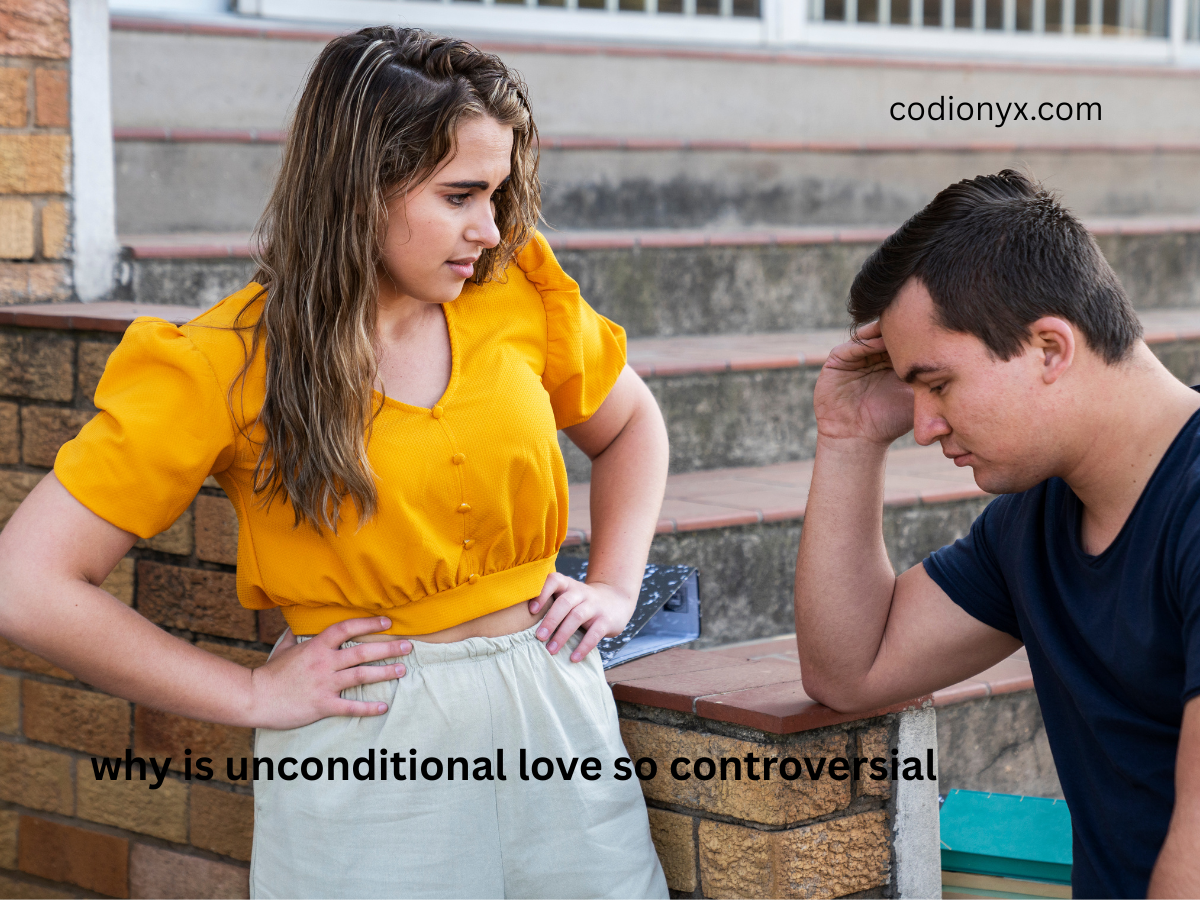The Introduction
Why is unconditional love so Controversial. The purest and most ideal kind of love is frequently depicted as unconditional love, which is the kind that gives without expecting anything in return. It is coveted in romantic relationships, extolled in religious writings, and celebrated in literature. Unconditional love is one of the most contentious and disputed subjects in contemporary relationships and psychology, despite its almost legendary reputation.
Why can something so ostensibly beautiful lead to such misunderstanding and conflict? Is limitless love really possible, and should we even aim for it?
The meaning, ramifications, objections, and emotional complexities of unconditional love are examined in this article, along with the reasons why it still causes disagreements in the fields of romance, family, and self-love.
Unconditional love: what is it
Fundamentally, unconditional love is the act of loving someone regardless of their actions, their behavior, or whether they return the favor. It is unconditional love that isn’t dependent on accomplishments, performance, or even respect for one another.
It is frequently defined as follows: idealistic romantic love; divine or spiritual love; or a parent’s love for their child.
“I love you no matter what” is the statement of unconditional love. But is that always a good thing?
Also read:https://codionyx.com/steven-yee-mac/
The Big Three: Where We Meet It
1. Love from parents
Unconditional love is typically associated with parents and children. Despite tantrums, failures, and even rebellion, a parent can still love their child. However, things become more complicated even in this case when kids grow up to become adults who might abuse or hurt that love.
2. Romantic Connections
Loving a partner unconditionally and remaining faithful “through thick and thin” is praised in many romantic films and novels. However, should love disregard neglect, infidelity, or abuse?
3. Love that is spiritual or divine
God’s love is frequently described as unconditional in religious texts. In Christianity, for example, God loves everyone who sins. Islam holds that Allah’s mercy is bound up with justice. The discussion is made more comfortable and complex by this theological backdrop.
Why Is Unconditional Love So Controversial Why Is It Such Contentious Issue?
1. It makes it harder to distinguish between tolerance for harm and love.
The main objection to unconditional love is that it might condone or support harmful conduct. Should you still love someone who consistently mistreats you? Critics contend that since unconditional love may erase boundaries, boundaries are necessary in all relationships.
2. It’s Seldom Completely Unconditional
In reality, the majority of love is conditional, depending on mutual effort, respect, or shared values. Persistent rejection or abuse can weaken affection even in parent-child relationships. Although the word “unconditional” is frequently used, conditions are always present in the subconscious.
3. Pressure and unrealistic expectations are created.
Demanding unconditional love could mean that the person wants to be loved regardless of their actions and without responsibility. This can lead to narcissism or entitlement, particularly in romantic relationships.
On the other hand, those who attempt to provide unconditional love risk emotional exhaustion and compromise their own needs and welfare in the name of loyalty.
4. It Is Incompatible With Growth and Self-Respect
Boundaries are necessary for self-respect. Letting go of relationships that drain us or hurt us is sometimes a necessary part of personal growth. Unconditional love may keep both people trapped in dysfunction even if they refuse to change.
Advocates claim that it is the purest form of love.
Many people continue to hold the view that unconditional love is admirable and even essential in spite of the criticisms, particularly in a society where transactional relationships are common. They contend that: • It fosters empathy and forgiveness; • It enables people to feel fully accepted rather than adored for their accomplishments or appearance; and • It fortifies enduring bonds during trying times.
Unconditional love is a fundamental principle for devoted partners, parents, therapists, and spiritual leaders. However, they frequently combine it with responsibility rather than naive acceptance.
Emotional and Psychological Hazards
Psychological difficulties may arise when giving unconditional love, particularly if it is not reciprocated.
Codependency: When one partner continuously compromises their identity, needs, or morals in order to maintain the relationship.
Emotional exhaustion: Depression or resentment can result from continuously showing love without getting assistance in return.
Loss of boundaries: People may put up with mistreatment or manipulation because they believe it to be devotion.
Therapists frequently advocate for balanced love, which is giving without being destructive.
Is Unconditional Love Good for You? Yes, provided that the idea isn’t completely rejected. Many professionals think that there is a healthier form of unconditional love, particularly when it is combined with self-awareness, mutual respect, emotional boundaries, and constant communication.
For instance: “I will not remain in a relationship where I am being mistreated, but I love you no matter what.”
This model preserves the fundamental qualities of unconditional love, such as intense devotion and care, without compromising mental health or dignity.
Conclusion:
why is unconditional love so controversial one of the most potent forces in human experience in unconditional love, but it’s also one of the most misinterpreted. Its extremes—being hailed as ideal or denounced as detrimental—are what cause its controversy.
Most likely, the truth is somewhere in the middle.
Love can be lovely if it perseveres through difficulties and is forgiving of errors. However, love that disregards harm or compromises one’s own value turns into a threat.
We should strive for love that is wise, deep, and kind—a love that elevates both the giver and the recipient—rather than striving for an ideal, boundless form of love.
The ultimate objective is to love with compassion, bravery, and care, even when it’s difficult, rather than to love unconditionally.
FAQs
Q1: Does a romantic relationship benefit from unconditional love?
Not all the time. Forgiveness and patience are vital, but unrestrained, unconditional love can encourage toxic behavior. Mutual respect and responsibility are essential components of healthy love.
Question 2: Is love really unconditional?
hardly ever. Boundaries and expectations are present in most human relationships. It can be challenging to maintain true unconditional love without suffering emotional repercussions and is frequently idealized.
Q3: If someone hurts you, is it acceptable to end your relationship with them?
Indeed. Maintaining your mental and emotional well-being is crucial from an Islamic, psychological, and ethical standpoint. Continued intimacy or love is not a prerequisite for forgiveness.
Q4: What distinguishes codependency from unconditional love?
Self-care is not overlooked by unconditional love, which is freely given. Losing one’s identity or putting up with abuse in order to maintain relationships are common symptoms of codependency.
Q5: Do parents need to love their kids without conditions?
Yes, but under supervision. Parents’ unconditional love is vital, but it should be combined with discipline, moral instruction, and a sense of accountability.










